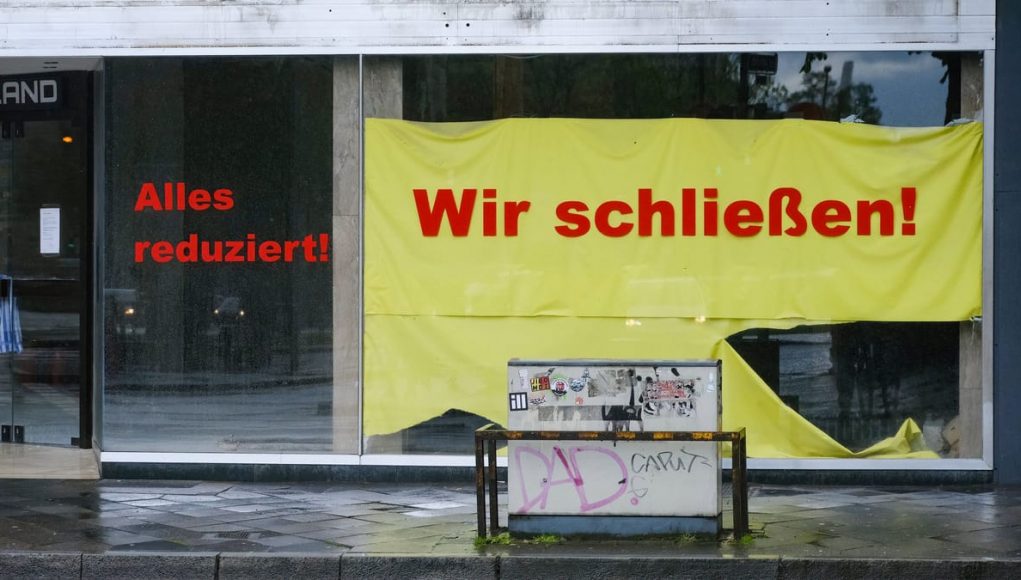FTI, Opti-Wohnwelt and Esprit: A wave of insolvencies is sweeping across Germany. But why exactly is this happening? t-online spoke to one of the most renowned insolvency administrators.
Shocking news for 1,300 employees: The stores of the insolvent fashion brand Esprit in Germany may soon have to cease operations. Potential investors are not interested in taking over the entire operation, said Esprit Europe GmbH, based in Ratingen, on Thursday.
Depending on which investor takes over, management will be forced to “shut down the company's business completely or in large parts in the coming months.”
- Wave of bankruptcies in Germany: The big sale is now underway
Esprit is just one example of thousands of companies that are currently in financial difficulty. According to the credit agency Creditreform, there were 11,000 in the first half of 2024. But why is that? t-online asked the insolvency administrator Sven-Holger Undritz.
t-online: Mr. Undritz, bankruptcies seem to be on the rise in Germany at the moment. Is that true or is the impression misleading?
Sven-Holger Undritz: Yes, bankruptcies are rising again. At the peak, the number of bankruptcies was up to 40,000, that was at the beginning of the millennium. Compared to that, we are currently well below that, with around 15,000 bankruptcies per year. But we also have to see that for around ten years, we have not seen a noticeable increase in insolvency proceedings.
Are you referring to the period of economic recovery after the financial crisis, approximately between 2010 and 2019?
That's right. Interest rates were very low, so companies could finance themselves very cheaply. But times have changed. Or rather, they are returning to normal. The last ten years were a big party, money no longer cost anything. But that is not the norm.

Sven-Holger Undritz heads the German restructuring and insolvency practice of the law firm White & Case. The business economist and specialist lawyer for insolvency law is one of the best-known German insolvency administrators. Undritz has represented the erotic retailer Beate Uhse and Europe's largest furniture manufacturer, Schieder Holding GmbH.
A certain amount of inflation and interest rates are part of macroeconomics. It is normal for money to cost money. Negative interest rates, as we have seen for a while, are the absolute exception. If this had been written in economic papers earlier, one would have been laughed at. The interest rate turnaround in 2022 triggered a more or less creeping process. As a result, many corporate financings ran into problems. This development is now gaining momentum because interest rates will remain high for the time being.
What other reasons are there for bankruptcies?
The increased costs are having a huge impact on many companies. A restaurateur once said to me: If I were to offer the schnitzel on a full cost basis, it would actually have to cost 44 euros. But nobody will pay you that. Energy prices in particular put many companies under pressure a year or two ago. Companies are now increasingly struggling with increased personnel costs, which are caused by the shortage of skilled workers, for example. There are also some companies that cannot afford the minimum wage. In addition, container prices are going crazy again.
… as was the case during the Corona period.
Logistics costs are extremely difficult to calculate. This is a major problem, especially for companies that depend on imports.
Embed
However, numerous exceptions were introduced during the pandemic. Will the bankruptcies now be made up for?
In part, certainly. The grand coalition under Merkel helped prevent many companies from going bankrupt through exemptions and Corona aid. Politically, that was perhaps the right thing to do because there was this unique emergency.
Unfortunately, it has led to many of those involved becoming sleepy. Some companies probably thought that things would go on like this forever. In addition, the regulations were extremely complex. Even experts could hardly understand which procedure they were currently in. One thing is clear: many companies now have to pay back the Corona aid. This is overwhelming for some. Overall, however, it is a multipolar conflict situation. And we have to be fair: management failure often plays a decisive role in the end when insolvency occurs.
If there is a reason for insolvency, such as insolvency, a company files for insolvency. A provisional insolvency administrator is appointed within a few hours. The administrator tries to quickly determine the reasons for the difficulties and speaks to customers and business partners. Employees receive insolvency benefits for up to three months.
A so-called M&A consultant then looks for an investor under considerable time pressure – who in the best case takes over the company, often under certain conditions.
The previous preliminary proceedings then lead to standard insolvency proceedings. At a creditors' meeting, the creditors vote on the insolvency plan and a new investor. If no investor can be found, a company must be wound up.
Because a company fails to adapt?
Correct. Keyword: structural change. If the business model is no longer right, if demand falls, you have to take products off the market that you can no longer sell. That is very painful. But you get nothing for the successes of the past. It is not uncommon for management to have missed the boat. It must be said clearly: insolvency is often home-made.































